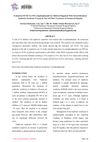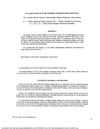 December 2022 in “Jurnal Farmasi Klinik Base Practice”
December 2022 in “Jurnal Farmasi Klinik Base Practice” Cyclophosphamide helped 59.4% of children with steroid-resistant nephrotic syndrome but caused side effects in 40.6%.
 January 2022 in “bioRxiv (Cold Spring Harbor Laboratory)”
January 2022 in “bioRxiv (Cold Spring Harbor Laboratory)” Skin lesions in Carney complex are likely caused by a specific group of skin cells that promote pigment production due to a genetic mutation.
 December 2021 in “Dermatology research”
December 2021 in “Dermatology research” Low levels of vitamin B12, ferritin, and calcium are linked to premature graying of hair.
 November 2021 in “Austin therapeutics”
November 2021 in “Austin therapeutics” Current treatments for hair loss from chemotherapy are limited, but new methods are being researched.
 February 2021 in “Journal of pharmaceutical and biological sciences”
February 2021 in “Journal of pharmaceutical and biological sciences” No cure exists for alopecia areata, and treatments are personalized.
 May 2020 in “Research Square (Research Square)”
May 2020 in “Research Square (Research Square)” Researchers found four key stages of cell development that are important for hair growth and shedding in cashmere goats.
 January 2020 in “Asian journal of applied science and technology”
January 2020 in “Asian journal of applied science and technology” Good nutrition is crucial for health and preventing disease, and supplements can help prevent nutrient deficiencies.
 October 2019 in “Turkderm”
October 2019 in “Turkderm” Patients with pernio have lower vitamin B12 and ferritin levels than healthy people.
 September 2019 in “Journal of evolution of medical and dental sciences”
September 2019 in “Journal of evolution of medical and dental sciences” Obesity significantly affects skin health, causing conditions like acanthosis nigricans and skin tags, and should be considered during skin exams.
 December 2018 in “IntechOpen eBooks”
December 2018 in “IntechOpen eBooks” Neurohormones help control skin health and could treat skin disorders.
 October 2018 in “InTech eBooks”
October 2018 in “InTech eBooks” The most effective treatments for hair loss are minoxidil, finasteride, PRP, and hair transplants, with steroids and immunosuppressants for autoimmune types.

New treatments for hair loss show promise, including plasma, stem cells, and hair-stimulating complexes, but more research is needed to fully understand them.
 July 2018 in “Elsevier eBooks”
July 2018 in “Elsevier eBooks” Some drugs can cause reversible hair loss, but certain chemotherapy drugs may lead to permanent hair loss; drugs can also change hair color and texture.
 February 2018 in “InTech eBooks”
February 2018 in “InTech eBooks” Diagnosing and treating PCOS is complex due to differing criteria and requires a team approach.
 January 2018 in “Springer eBooks”
January 2018 in “Springer eBooks” Terbinafine is the most effective medicine for fungal nail infections, especially for diabetics and those with weak immune systems.

Proretinal nanoparticles are a safe and effective way to deliver retinal to the skin.
 January 2018 in “International journal of food and nutrition research”
January 2018 in “International journal of food and nutrition research” Intermittent iron and nutritional supplements can help reduce hair loss.
 January 2017 in “Springer eBooks”
January 2017 in “Springer eBooks” Eating a balanced diet with specific nutrients can help manage menopause symptoms and prevent related health issues.
 January 2017 in “Springer eBooks”
January 2017 in “Springer eBooks” The document explains various skin conditions and their treatments.
 September 2016 in “Annals of occupational and environmental medicine”
September 2016 in “Annals of occupational and environmental medicine” Cleanroom workers in a battery factory have worse skin and eye conditions due to the very dry environment.
 March 2012 in “EFSA Journal”
March 2012 in “EFSA Journal” Iron intake has not been proven to maintain normal hair growth.

Use the least toxic, most specific treatments for skin diseases, considering side effects and individual patient needs.

Most American men experience hair loss by age 50, with limited effective treatments available and new options not expected soon.
 December 2009 in “DergiPark (Istanbul University)”
December 2009 in “DergiPark (Istanbul University)” Check serum ferritin levels and total blood count for women with diffuse hair loss.
 January 2007 in “Elsevier eBooks”
January 2007 in “Elsevier eBooks” Alopecia areata is a reversible, autoimmune-related hair loss that can have significant emotional impact and uncertain treatment effectiveness.
 June 2006 in “British Journal of Dermatology”
June 2006 in “British Journal of Dermatology” Lower adrenal hormone levels may cause hair loss in postmenopausal women, certain patterns help diagnose nail cancer, and a gene variant linked to higher skin cancer risk in kidney transplant patients suggests monitoring folate levels.
 January 2006 in “The Journal of Korean Medicine Ophthalmology and Otolaryngology and Dermatology”
January 2006 in “The Journal of Korean Medicine Ophthalmology and Otolaryngology and Dermatology” Rubus coreanum may help hair growth but not through the tested mechanisms, and none of the herbal extracts help with acne.
 September 2004 in “Experimental dermatology”
September 2004 in “Experimental dermatology” Melatonin directly affects mouse hair follicles and may influence hair growth.
 January 2002 in “Dermatologic Surgery”
January 2002 in “Dermatologic Surgery” Minoxidil is effective in preventing hair loss after facelift surgery.
 July 1998 in “Proceedings of SPIE”
July 1998 in “Proceedings of SPIE” Low-power laser therapy is an effective, side-effect-free treatment that speeds up hair regrowth and crural ulcer healing.





























